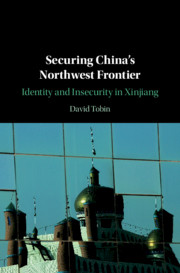Book contents
- Securing China’s Northwest Frontier
- Securing China’s Northwest Frontier
- Copyright page
- Dedication
- Contents
- Figures
- Abbreviations
- Introduction
- 1 Securing China on the Multi-Ethnic Frontier
- 2 Mass Education as an Identity-Security Practice
- 3 ‘East Turkestan’ in China’s Identity and Security Narratives
- 4 Identity and Insecurity after ‘7-5’
- 5 Performing Inclusion of the Uyghur Other
- 6 Han and Uyghur Narratives on Ethnic and National Identity
- 7 Han and Uyghur Narratives on Identity and Insecurity
- Conclusion
- Book part
- Bibliography
- Index
7 - Han and Uyghur Narratives on Identity and Insecurity
Published online by Cambridge University Press: 18 September 2020
- Securing China’s Northwest Frontier
- Securing China’s Northwest Frontier
- Copyright page
- Dedication
- Contents
- Figures
- Abbreviations
- Introduction
- 1 Securing China on the Multi-Ethnic Frontier
- 2 Mass Education as an Identity-Security Practice
- 3 ‘East Turkestan’ in China’s Identity and Security Narratives
- 4 Identity and Insecurity after ‘7-5’
- 5 Performing Inclusion of the Uyghur Other
- 6 Han and Uyghur Narratives on Ethnic and National Identity
- 7 Han and Uyghur Narratives on Identity and Insecurity
- Conclusion
- Book part
- Bibliography
- Index
Summary
The final chapter uses semi-structured interviews with Han and Uyghurs in Ürümchi to analyse their responses to official security narratives. The first section analyses how Han use official discourses of danger to securitise their own identities, defined through ethnicity, lineage, and language. Working-class and getihu Han deployed party-state discourses to articulate China as an ethnic Han nation under threat from Turkic-Islamic Uyghurs. Han intellectuals emphasise Uyghur inclusion in Chinese civilisation represents the real Zhonghua Minzu but without addressing the Han-centrism of this inclusion. The second section analyses how Uyghurs securitise identities and articulate China as an existential threat by re-performing official and unofficial Chinese narratives on Uyghur-ness. Uyghurs invert party-state discourses, articulating Han as part of a state-led cultural assimilation project through demographic and linguistic transformation. The Han-Uyghur ethnic boundary is redirected inwards between Uyghurs educated in Uyghur (minkaomin 民考民) and those ‘Sinicised’ by Mandarin-medium education (minkaohan 民考汉). Han and Uyghurs use tensions between inclusion and exclusion in official Zhonghua Minzu narratives to understand daily experiences of ethnic boundaries and articulate competing identity-security narratives. The chapter shows the party-state’s attempt to increase security by identifying China’s friends and eliminating enemies produces perpetual insecurity.
Keywords
- Type
- Chapter
- Information
- Securing China's Northwest FrontierIdentity and Insecurity in Xinjiang, pp. 192 - 221Publisher: Cambridge University PressPrint publication year: 2020



